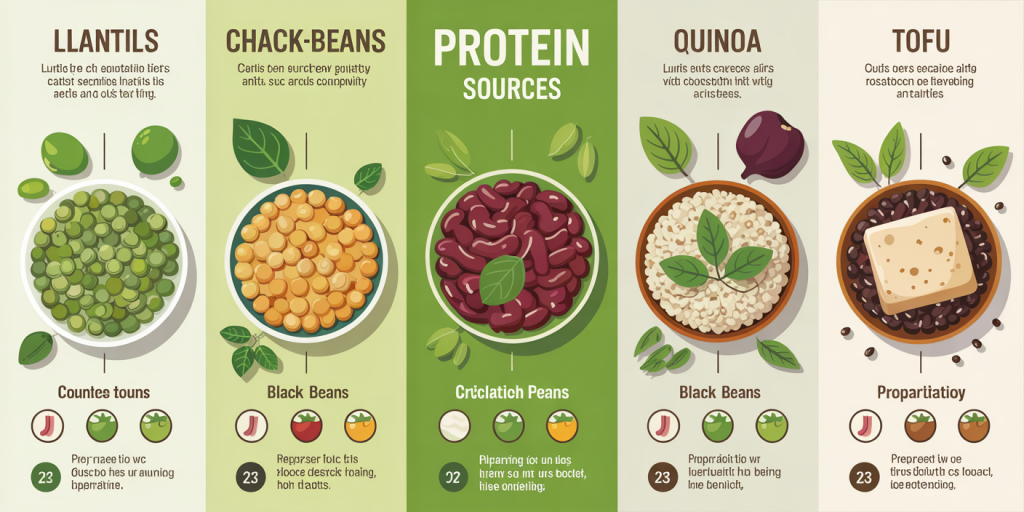In recent years, the Meatless Monday movement has gained significant traction worldwide, encouraging individuals to reduce their meat consumption by dedicating one day a week to plant-based meals. Originating as a public health campaign during World War I, Meatless Monday is now a popular lifestyle choice aimed at improving personal health, reducing environmental impact, and promoting animal welfare. According to a 2023 survey by the Plant-Based Foods Association, about 38% of Americans participate in Meatless Monday or similar practices, reflecting increasing awareness around sustainable eating habits.

Embracing Meatless Monday does not mean compromising on flavor or satisfaction. On the contrary, the diversity and richness of plant-based recipes have expanded remarkably. From savory lentil stews to vibrant vegetable stir-fries, the variety of dishes available to those adopting meat-free meals is vast and exciting. This article explores practical and delicious Meatless Monday recipes, highlighting nutritional benefits, preparation tips, and future trends in plant-forward eating.
The Rising Popularity of Meatless Monday and Its Benefits
As global concerns over climate change escalate, the food industry is one of the major sectors contributing to greenhouse gas emissions, with livestock farming accounting for approximately 14.5% of global emissions (Food and Agriculture Organization, 2022). This environmental impact has prompted individuals and organizations to shift towards more sustainable eating patterns. Meatless Monday serves as an accessible entry point for many people, making it easier to adopt plant-based meals without overhauling their entire diet.
Health benefits associated with a plant-based diet are well-documented. Research published in the Journal of Nutrition (2021) shows that reducing meat intake—even one day a week—can lower the risk of heart disease, diabetes, and certain cancers. Additionally, plant-based meals tend to be richer in fiber, vitamins, and antioxidants. Real-life case studies, such as the adoption of Meatless Monday in New York City’s public school cafeterias, where students were served meat-free meals once a week, demonstrated a 12% increase in vegetable consumption among children over one year.
In practical terms, Meatless Monday encourages experimentation with legumes, whole grains, seasonal vegetables, and plant-based proteins. This shift not only benefits individual health and planetary wellbeing but also diversifies culinary choices, reducing dependency on meat-heavy diets.

Essential Ingredients for Successful Meatless Monday Recipes
Transitioning to meat-free meals can seem daunting initially, but understanding key ingredients can make the process seamless and enjoyable. Legumes such as lentils, chickpeas, and black beans are nutritional powerhouses, rich in protein, fiber, and iron. For example, one cup of cooked lentils contains about 18 grams of protein and 16 grams of fiber, making them a hearty and satisfying meat alternative.

Whole grains like quinoa, bulgur, and farro complement plant proteins by providing complex carbohydrates, essential amino acids, and micronutrients. Quinoa, often called a “complete protein,” is unique among grains as it contains all nine essential amino acids, making it a valuable addition to Meatless Monday meals.
Vegetables, particularly leafy greens (spinach, kale) and cruciferous varieties (broccoli, cauliflower), enhance the nutrient density of meals while adding texture and color. Furthermore, nuts, seeds, and plant-based dairy alternatives contribute healthy fats and calcium. Incorporating these ingredients in recipes not only enhances taste and appearance but also ensures a balanced nutritional profile.
Comparison of Plant-Based Protein Sources
| Protein Source | Protein per 100g | Fiber (g) | Key Nutrient | Preparation Tips |
|---|---|---|---|---|
| Lentils | 9g | 8g | Iron, Folate | Soak and boil; use in stews |
| Chickpeas | 8.9g | 7.6g | Manganese, Magnesium | Roast for snacks or mash for dips |
| Black Beans | 8.9g | 8.7g | Folate, Antioxidants | Slow cook or pressure cook |
| Quinoa | 4.4g | 2.8g | Complete Protein, Magnesium | Rinse thoroughly before cooking |
| Tofu | 8g | 0.3g | Calcium, Iron | Press and marinate for grilling or stir-fry |
This comparison illustrates the versatility and nutritional benefits of diverse plant proteins, essential for crafting satisfying Meatless Monday dishes.
Easy and Tasty Meatless Monday Recipe Ideas
Starting a Meatless Monday routine often requires simple, palatable recipes that fit into busy lifestyles. Below are some accessible and delicious options that require minimal ingredients and cooking skills yet deliver flavor and nutrition.
1. Lentil and Vegetable Stir-Fry
This recipe combines the earthy flavor of lentils with vibrant vegetables like bell peppers, snap peas, and carrots. Lentils are pre-cooked and tossed into a stir-fry sauce made from soy sauce, garlic, and ginger. This dish takes under 30 minutes and provides around 20 grams of protein per serving, making it a balanced, filling meal.
2. Chickpea and Spinach Curry
A popular dish in Indian cuisine, chickpea curry can be made flavorful with spices like turmeric, cumin, and coriander. This dish is rich in fiber, plant protein, and iron, and pairs well with brown rice or quinoa. Simmering canned chickpeas avoids long preparation times, perfect for those busy evenings.
3. Roasted Vegetable and Quinoa Salad
Combining roasted seasonal vegetables such as sweet potatoes, zucchini, and red onions with quinoa and a lemon-tahini dressing creates a refreshing and nutrient-dense bowl. This salad can be prepared ahead of time and served cold, ideal for lunch or light dinners.
4. Black Bean Burgers
Ground black beans mixed with oats, onions, and spices form a tasty plant-based burger patty that can be grilled or pan-fried. Served with whole grain buns and fresh toppings, this popular recipe offers a familiar texture and flavor profile for meat-eaters considering plant-based alternatives.
Each of these recipes illustrates how Meatless Monday meals can be both flavorful and nourishing, demonstrating that plant-based eating does not require sacrifice or inconvenience.
Strategies for Incorporating Meatless Monday into Daily Life
Adopting Meatless Monday successfully often depends on mindset and preparation. Planning ahead is critical to avoid last-minute meals dominated by processed foods or heavy carbohydrates. Keeping a weekly menu and grocery list focused on fresh produce, legumes, and whole grains sets the stage for seamless implementation.
Meal prepping is another highly effective strategy. For example, cooking large batches of lentils or beans and storing them in the fridge or freezer reduces cooking time during the week. Pre-chopping vegetables and preparing sauces or dressings can speed up meal assembly, making meatless meals convenient and quick.
Social support and community involvement also enhance adherence to Meatless Monday. Participating in local or online groups sharing recipes and tips fosters motivation and a sense of belonging. Educational institutions, workplaces, and restaurants increasingly support meatless options, reflecting a societal shift that makes healthier choices easier and more accessible.
Nutritional Insights and Addressing Common Concerns
One common concern about meatless meals is ensuring adequate protein intake. While animal products are protein-rich, plant foods also provide sufficient protein when consumed in balanced combinations. For example, combining legumes and grains achieves a full spectrum of essential amino acids.
Additionally, monitoring micronutrients such as vitamin B12, iron, and omega-3 fatty acids is essential for those reducing animal product consumption. Vitamin B12 requires supplementation or fortified foods since it is primarily found in animal-derived products. Iron absorption from plant foods can be enhanced by consuming vitamin C-rich ingredients concurrently (e.g., adding bell peppers or citrus fruits to meals).
A nutrient-focused approach assures balanced and healthy Meatless Monday meals that support long-term wellbeing. Registered dietitians often recommend this gradual transition to minimize nutrient gaps and promote sustainable dietary habits.
Future Perspectives: The Growing Trend of Plant-Based Eating
The future of Meatless Monday recipes is bright, supported by ongoing consumer interest and food technology innovations. Sales of plant-based meat alternatives grew by 18% globally in 2023 alone (Statista, 2024), reflecting a rising market for convenient and tasty meat substitutes.
Emerging ingredients such as pea protein, mycoprotein, and lab-grown meats further expand the possibilities for meatless meals. Innovations in culinary techniques allow chefs to recreate meat textures and flavors that appeal to diverse palates. Additionally, sustainability commitments by governments and corporations contribute to making plant-based foods an accessible norm.
Educational campaigns, increased transparency about environmental footprints, and improved affordability of plant-based ingredients are expected to drive the momentum of Meatless Monday and similar initiatives. This trend aligns with global priorities around climate change mitigation, food security, and health promotion, suggesting meatless meals will become an integral part of daily diets worldwide.
Optimizing Your Meals for Meatless Mondays: Practical Tips
To maximize the benefits of Meatless Monday, consider incorporating seasonal and locally sourced produce. Seasonal vegetables are often more nutrient-dense and affordable, reducing the environmental cost of long-distance transportation. For instance, autumn squash and root vegetables can be the basis of hearty meatless stews during cooler months, while summer offers abundant fresh beans and tomatoes ideal for salads and light dishes.
Another useful tip is to experiment with herbs and spices for flavor enhancement. Ingredients like fresh basil, rosemary, cumin, and smoked paprika can transform simple vegetable dishes into gourmet-like experiences without relying on meat’s umami flavor.
Documenting your successful recipes and building a personal Meatless Monday cookbook fosters creativity and confidence. Sharing meals with family or friends adds a social dimension that enriches the experience and normalizes sustainable food choices.
By embracing these strategies, Meatless Monday becomes an enjoyable and healthful habit rather than a restrictive challenge.
—
With growing evidence supporting the environmental, nutritional, and economic advantages of plant-based eating, Meatless Monday recipes offer a practical gateway to a more sustainable lifestyle. Through thoughtful ingredient selection, easy preparation techniques, and embracing culinary diversity, anyone can create delicious and nourishing meals that honor both personal health and the planet’s wellbeing. As interest in sustainable eating continues to surge globally, Meatless Monday is set to remain a cornerstone of modern dietary practices, inspiring innovations in food culture and consumption for years to come.

Deixe um comentário